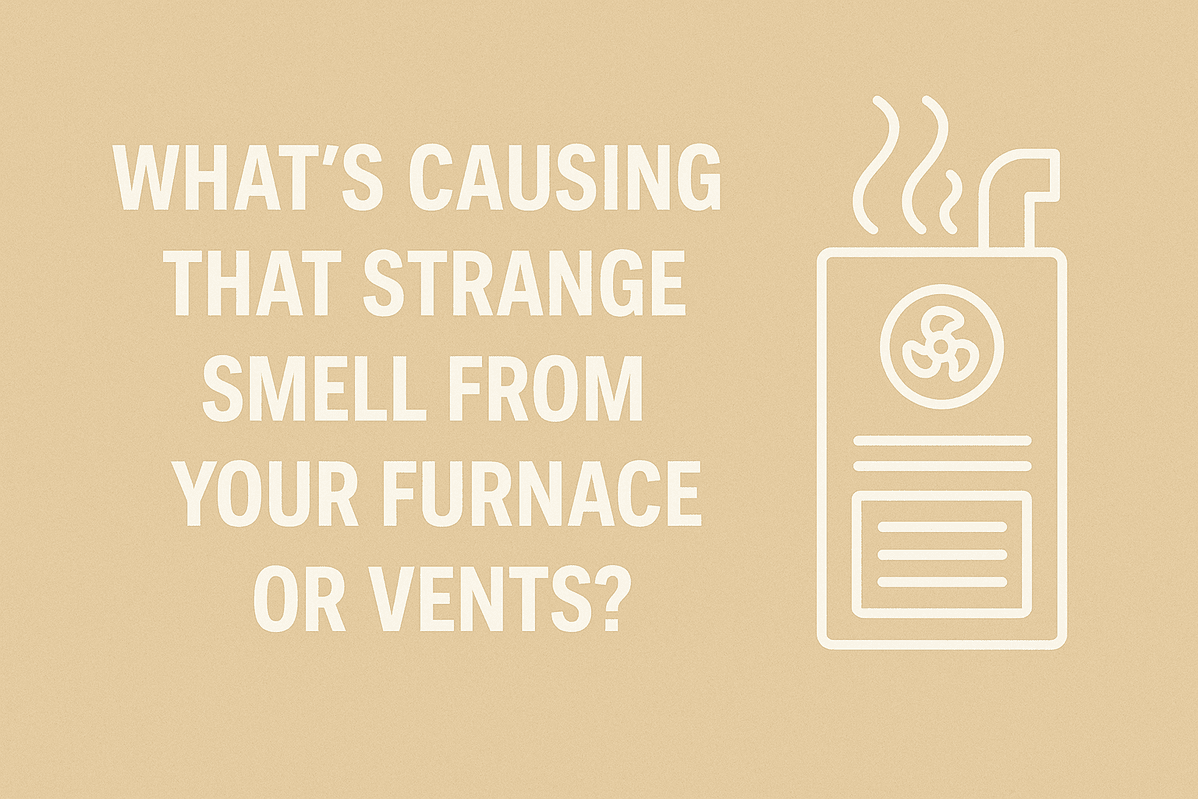A strange smell coming from your furnace or vents can be unsettling, especially when it lingers throughout your home. While many homeowners worry that something is seriously wrong, odors from your heating system can stem from several common causes—some harmless and others requiring immediate attention. Understanding the source of these smells not only gives peace of mind but also ensures the safety, efficiency, and longevity of your HVAC system.
Common Furnace and Vent Smells You Shouldn’t Ignore
Burning Dust Odor
When you first turn on your furnace after months of inactivity, a burning smell is normal. Dust accumulates on the heat exchanger and burners during the off-season. Once the system heats up, this dust burns off and produces a temporary smell.
- Duration: Should last only a few hours.
- Solution: If it continues beyond a day, schedule a furnace cleaning.
Electrical or Burning Plastic Smell
A sharp, acrid odor similar to melting plastic or burning wires can signal electrical problems within the furnace.
- Causes: Faulty wiring, overheating blower motor, or malfunctioning electrical components.
- Danger: Potential fire hazard.
- Action: Turn off your furnace immediately and contact a licensed HVAC technician.
Rotten Egg or Sulfur Smell
A strong odor of rotten eggs is a red flag. Natural gas suppliers add sulfur (mercaptan) to gas so leaks can be detected.
- Danger: Possible gas leak.
- Immediate Steps:
- Turn off the furnace.
- Evacuate the home.
- Call your gas company and emergency services.
- Never ignore this odor.
Musty or Moldy Smell
If the air from your vents smells damp or musty, it often points to mold or mildew growth inside ductwork or near the evaporator coil.
- Health Risk: Prolonged exposure can worsen allergies and respiratory issues.
- Fix: Schedule professional duct cleaning and check for drainage or humidity problems.
Chemical or Formaldehyde Smell
A sharp chemical odor could indicate a cracked heat exchanger. This allows dangerous gases, including carbon monoxide, to circulate in your home.
- Warning Signs: Along with the odor, you may notice soot, water pooling around the furnace, or flu-like symptoms in family members.
- Action Required: Shut down the furnace and call an HVAC technician immediately.
Oil or Smoky Smell
If you use an oil furnace, a smoky or oily smell often means incomplete combustion or clogged filters.
- Risks: Poor efficiency, higher utility bills, and potential health hazards.
- Solution: Replace filters, and if the issue persists, request a professional inspection.
Seasonal and Situational Causes of Furnace Smells
After Repairs or Installation
It’s common to notice new or unusual smells after your furnace has been serviced or newly installed. Lubricants, coatings, or adhesives may burn off during the first few cycles. These odors should fade within days.
Blocked Vents or Airflow Issues
When vents are obstructed by furniture, rugs, or debris, your furnace may overheat, releasing hot, burnt smells into your home. Regularly check vents and ensure free airflow.
Dead Animal Smell
Unfortunately, rodents or small animals can crawl into ductwork and become trapped. When this happens, a foul odor spreads quickly. Professional cleaning is required to remove the source and sanitize ducts.
Why Addressing Furnace Smells Matters
- Safety First: Ignoring unusual odors can lead to life-threatening issues like gas leaks or carbon monoxide poisoning.
- System Longevity: Prompt maintenance helps avoid costly breakdowns and extends the lifespan of your furnace.
- Health Protection: Eliminating mold, mildew, and fumes ensures cleaner indoor air quality.
- Energy Efficiency: A clean, well-functioning system reduces energy bills and improves comfort.
Steps to Take When You Notice Strange Furnace Smells
- Identify the Odor Type – Use the descriptions above as a guide.
- Act Quickly on Dangerous Odors – Shut down the furnace and call professionals if you detect gas, chemicals, or electrical burning.
- Inspect Filters and Vents – Clogged filters and blocked airflow often cause minor smells.
- Schedule Annual Maintenance – Preventive tune-ups catch problems before they escalate.
- Invest in Carbon Monoxide Detectors – Essential for homes with gas furnaces.
Preventing Strange Furnace Odors
- Change Filters Regularly: Replace every 1–3 months, depending on use and air quality.
- Keep Ducts Clean: Have ducts inspected and cleaned every few years.
- Seal Air Leaks: Prevent excess dust and humidity from entering the system.
- Routine Professional Inspections: Ensure all components are safe, clean, and functioning properly.
When to Call a Professional HVAC Technician
If you smell anything beyond mild dust burning at startup, don’t ignore it. An experienced HVAC technician can:
- Detect gas leaks and repair them.
- Inspect electrical components for overheating or damage.
- Clean and sanitize ducts.
- Check for cracks in the heat exchanger.
- Replace or repair faulty parts safely.
Timely intervention not only prevents expensive repairs but also protects your family’s health and safety.
Final Thoughts
A strange smell from your furnace or vents should never be brushed off. From burning dust to dangerous gas leaks, every odor has a root cause that must be addressed. Regular maintenance, quick action, and professional inspections are your best defenses against system breakdowns and health risks.
Ensure your furnace works efficiently, keeps your home safe, and delivers fresh, clean air all season long.

